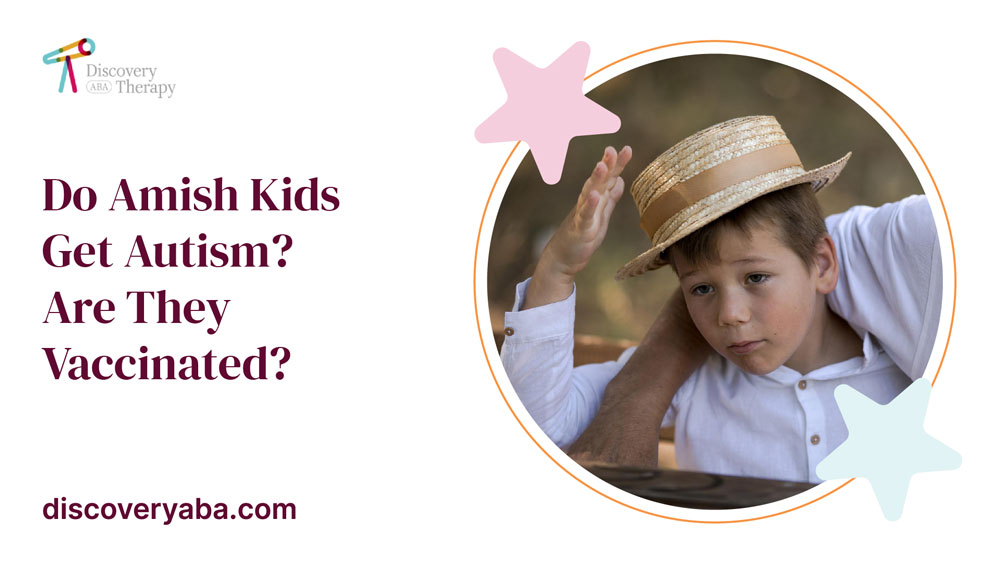Do Amish Kids Get Autism? Are They Vaccinated?
There is a common misconception that the Amish do not vaccinate their children. However, this is not entirely true.

Do Amish Kids Get Autism? Are They Vaccinated?
The Amish community is known for their traditional way of life, which includes shunning modern conveniences such as electricity and cars.
This has led to many questions about their health practices, including their vaccination rates and the prevalence of autism among their children. In this blog post, we'll explore these questions and provide some answers.

Vaccination Rates Among the Amish Community
There is a common misconception that the Amish do not vaccinate their children. However, this is not entirely true.
While it is true that the Amish community has lower vaccination rates than the general population, they do still vaccinate their children. In fact, the Amish have been known to vaccinate their children against diseases such as measles, mumps, rubella, and polio.
The reason for the lower vaccination rates among the Amish is likely due to their religious beliefs and the fact that they place a high value on natural remedies and traditional medicine. Some members of the Amish community also believe that vaccines are harmful to their children's health.
Autism Rates Among the Amish Community
There is little research available on the prevalence of autism among the Amish community. However, it is believed that the rates of autism are lower among the Amish than in the general population. This could be due to a number of factors, including their lifestyle and the fact that they are less exposed to environmental toxins.
Autism is a complex disorder with no single cause, and it is not caused by vaccines. While vaccines have been falsely linked to autism in the past, numerous studies have shown that there is no link between vaccines and autism. The scientific consensus is that vaccines are safe and effective and do not cause autism.
Healthcare Practices in The Amish Community
Healthcare practices in The Amish community differ from those in mainstream society.
The Amish place a high value on self-sufficiency, and they prefer to use natural remedies and traditional medicine instead of relying on modern medical practices. They believe that the body has the ability to heal itself, and that illness is often a result of poor diet or living conditions.
For minor illnesses and injuries, the Amish will often consult with their community's "healer," who is typically an experienced member of the community with knowledge of natural remedies. In more serious cases, they may seek medical treatment from a doctor outside of their community, but only if it is deemed necessary.
The Amish also maintain a strong sense of community and are known for helping each other in times of need. This includes helping with healthcare needs, such as providing transportation to medical appointments or assisting with home care for sick or elderly members.
Overall, healthcare plays a different role in the Amish way of life than it does in mainstream society. While they do value modern medicine to some extent, they also place a high value on natural remedies and traditional healing practices.
The Amish Community's Approach to Mental Health
The Amish community's approach to mental health differs significantly from that of mainstream society. Mental illness is often stigmatized in the Amish community, and seeking outside help for mental health issues is not common.
Instead, the Amish rely on their tight-knit community for support when dealing with mental health challenges. They believe that prayer, faith, and communal support are effective ways to cope with mental illness.
In some cases, the Amish may also turn to traditional remedies or alternative therapies such as herbal supplements or acupuncture. However, seeking professional medical help for mental health issues is generally viewed as a last resort.
This approach to mental health care can sometimes lead to untreated or under-treated mental illness within the Amish community. However, it is important to note that this is not unique to the Amish community and is a problem in many rural areas where access to mental health care can be limited.
Despite these challenges, the Amish continue to place a high value on their traditions and way of life, which includes relying on their community for support during difficult times.
The Role of Natural Remedies in Overall Health Outcomes
The reliance on natural remedies within the Amish community has been a topic of interest among researchers and health professionals. While there is limited research on the efficacy of natural remedies, some studies have suggested that they may have some health benefits.
However, it is important to note that relying solely on natural remedies can also have negative consequences for overall health outcomes. For example, some illnesses may require medical intervention, such as antibiotics or surgery, to be effectively treated. Relying solely on natural remedies in these cases could result in more serious health complications.
Overall, it is important to strike a balance between traditional medicine and natural remedies in order to achieve optimal health outcomes. While the Amish community's reliance on natural remedies should be respected, it is also important to ensure that individuals have access to appropriate medical care when needed.
Comparison of Autism Rates Among Religious Communities
While there is limited research on the prevalence of autism within the Amish community, some studies have compared autism rates between the Amish and other religious communities that share similar beliefs. One such study found that autism rates were indeed lower among the Amish when compared to other groups.
The study examined children from four different religious communities, including the Amish, Hutterites, Old Order Mennonites, and a control group of non-religious families. The results showed that the prevalence of autism among the Amish was significantly lower than in the other groups.
This study had limitations, including a small sample size and potential biases. However, it does suggest that there may be something unique about the lifestyle or genetics of the Amish community that contributes to their lower rates of autism.
The Role of Government Agencies in Promoting Vaccination and Healthcare Access
Government agencies play an important role in promoting vaccination and healthcare access for underrepresented populations like the Amish community. In many cases, these agencies provide education about vaccines and other healthcare practices through outreach programs and partnerships with local organizations.
Additionally, some government agencies provide funding for healthcare initiatives that specifically target underrepresented populations. For example, the Centers for Disease Control and Prevention (CDC) has a program called Vaccines for Children that provides free vaccines to children who might not otherwise have access to them.
While these efforts are important, there is still work to be done in ensuring that all individuals have access to appropriate healthcare. This includes addressing barriers such as language barriers, lack of transportation, and cultural differences.
Overall, government agencies can play a critical role in promoting vaccination and healthcare access for underrepresented populations like the Amish community. By working together with local organizations and providing resources and education, we can help ensure that everyone has access to the care they need to stay healthy.
The Potential Impact of Increased Healthcare Access on Overall Health Outcomes Within the Amish Community
The Amish community's reliance on natural remedies and traditional medicine has been a topic of interest among researchers and health professionals. While there may be some health benefits to this way of life, it is important to ensure that individuals have access to appropriate medical care when needed.
Limited access to healthcare can lead to negative health outcomes, including preventable diseases and complications from untreated illnesses. By increasing healthcare access within the Amish community, individuals would have better access to preventative care, early detection of illnesses, and treatment options.
One potential solution for increasing healthcare access within the Amish community is through telemedicine. Telemedicine allows patients to receive medical care remotely, which could be particularly beneficial for those living in rural areas or who have limited transportation options.
In addition to telemedicine, outreach programs that provide education about vaccines and other healthcare practices could also help improve overall health outcomes within the Amish community. By working together with local organizations and government agencies, we can help ensure that everyone has access to the care they need to stay healthy.
Ethical Considerations in Healthcare Practices Within the Amish Community
The Amish community's healthcare practices raise important ethical considerations related to informed consent and autonomy. Informed consent is the process of obtaining permission from a patient before conducting any medical treatment or procedure. Autonomy refers to an individual's right to make their own decisions about their healthcare.
Within the Amish community, there may be challenges to obtaining informed consent due to language barriers or limited access to information about medical procedures. Additionally, some members of the community may be hesitant to seek medical treatment due to religious beliefs or cultural values.
This raises questions about whether individuals within the Amish community have the ability to make fully informed decisions about their healthcare. It also highlights the importance of providing education and resources in a way that is accessible and culturally appropriate.
Another ethical consideration is related to autonomy. While individuals have the right to make their own decisions about their healthcare, there may be situations where the decision made by an individual conflicts with what is considered medically necessary or in their best interest.
For example, a parent may choose not to vaccinate their child despite recommendations from medical professionals because of religious beliefs. This can lead to tension between individual autonomy and public health concerns.
Overall, it is important for healthcare providers working with individuals within the Amish community to be aware of these ethical considerations and work with patients and families in a way that respects their values while also ensuring that they have access to appropriate medical care.
FAQs
Do the Amish refuse all vaccines?
No, while the Amish have lower vaccination rates than the general population, they do still vaccinate their children. In fact, the Amish have been known to vaccinate their children against diseases such as measles, mumps, rubella, and polio.
Is there a link between vaccines and autism?
No, there is no scientific evidence that vaccines cause autism. Numerous studies have shown that there is no link between vaccines and autism. The scientific consensus is that vaccines are safe and effective.
Why do some members of the Amish community believe that vaccines are harmful?
Some members of the Amish community believe that vaccines are harmful due to religious beliefs and a preference for natural remedies and traditional medicine. However, it is important to note that relying solely on natural remedies can also have negative consequences for overall health outcomes.
Are autism rates higher or lower among the Amish community compared to other groups?
While there is little research available on the prevalence of autism among the Amish community, some studies have suggested that autism rates may be lower among the Amish when compared to other religious communities that share similar beliefs.
What healthcare practices do the Amish follow?
The Amish place a high value on self-sufficiency and prefer to use natural remedies and traditional medicine instead of relying on modern medical practices. They believe that illness is often a result of poor diet or living conditions.
For minor illnesses and injuries, they will often consult with their community's "healer," who is typically an experienced member of the community with knowledge of natural remedies.
How can government agencies promote vaccination and healthcare access for underrepresented populations like the Amish community?
Government agencies can provide education about vaccines and other healthcare practices through outreach programs and partnerships with local organizations.
Additionally, some government agencies provide funding for healthcare initiatives that specifically target underrepresented populations. By working together with local organizations and providing resources and education, we can help ensure that everyone has access to the care they need to stay healthy.
Conclusion
In conclusion, the Amish community does vaccinate their children, but at a lower rate than the general population. The prevalence of autism among the Amish community is believed to be lower than in the general population, likely due to a combination of factors.
It is important to remember that vaccines are safe and effective, and do not cause autism. It is crucial to get vaccinated to protect yourself and those around you from preventable diseases.
References
https://apnews.com/article/fact-check-amish-covid-vaccines-cancer-diabetes-autism-356029928165
https://fullfact.org/health/amish-vaccines-autism-adhd-gmo/
https://www.nbcnews.com/health/kids-health/one-more-study-shows-vaccines-don-t-cause-autism-n345611
Does Your Child Have An Autism Diagnosis?
Learn More About How ABA Therapy Can Help
Find More Articles
Contact us
North Carolina, Nevada, Utah, Virginia
New Hampshire, Maine
Arizona, Colorado, Georgia, New Mexico, Oklahoma, Texas
.avif)




































































































